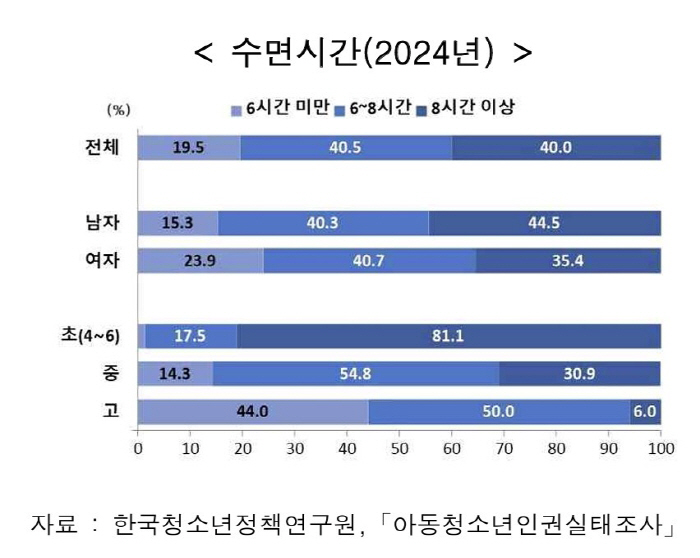Adolescents have serious sleep deprivation on weekdays...Two hours of weekend supplementary sleep reduces anxiety and depression
Jun 11, 2025
Growing adolescents have a serious lack of sleep.
The American Academy of Sleep Medicine recommends 8 to 10 hours of regular sleep for optimal health for adolescents aged 13 to 18, but only 23% of adolescents get enough sleep on weekdays, according to data from the U.S. Centers for Disease Control and Prevention (CDC).
In Korea, according to youth statistics released by the Ministry of Gender Equality and Family, the average sleep time of elementary, middle, and high school students in 2024 was 7.3 hours on weekdays, 8.7 hours for elementary school students, 7.2 hours for middle school students, and 6.0 hours for high school students. In particular, 44% of high school students spent less than 6 hours.
As such, many teenagers solve their lack of sleep on weekdays by sleeping late on weekends. If so, how good is 'Catch-up sleep'?
At the American Society of Sleep Medicine (AASM) annual meeting (SLEEP 2025) in Derian, Illinois, on the 11th, Eugene Ori University researcher Kim So-jung (doctor's course) observed internalization symptoms such as sleep time and anxiety in 1,800 adolescents and announced a study that weekend supplementary sleep is appropriate for less than two hours.
Teenagers who slept up to two hours more on weekends than on weekdays had fewer internalization symptoms such as anxiety and depression than those who did not sleep longer on weekends, and internalization symptoms increase when the weekend supplementary sleep time exceeds two hours. Getting enough sleep is associated with health improvements such as concentration, behavior, learning, memory, emotion control, quality of life, and mental and physical health, and lack of sleep in the teenage period is associated with the risk of problems such as depression and suicidal thoughts.
In this study, 1877 adolescents (average age of 13.5) were measured on weekdays and weekends with a smartwatch Fitbit, and internalization symptoms were evaluated using the Child Behavior Assessment Scale (CBL), which evaluates emotional and behavioral problems of children and adolescents. The comparison was divided into groups with no difference in sleep time on weekdays and weekends, groups with 0 to 2 hours of supplemental sleep on weekends, and groups with more than 2 hours of supplemental sleep.
As a result, when the supplemental sleep time is 0 to 2 hours, internalization symptoms such as anxiety and depression are statistically significantly reduced compared to the group without supplemental sleep. On the other hand, if the supplemental sleep time is more than 2 hours, the longer the sleep time, the more the internalization symptoms increase slightly.
The research team says it is important to understand the optimal sleep balance in adolescence"Further research is needed to clarify the direction of these relationships" he added.
The American Academy of Sleep Medicine recommends 8 to 10 hours of regular sleep for optimal health for adolescents aged 13 to 18, but only 23% of adolescents get enough sleep on weekdays, according to data from the U.S. Centers for Disease Control and Prevention (CDC).
|
As such, many teenagers solve their lack of sleep on weekdays by sleeping late on weekends. If so, how good is 'Catch-up sleep'?
At the American Society of Sleep Medicine (AASM) annual meeting (SLEEP 2025) in Derian, Illinois, on the 11th, Eugene Ori University researcher Kim So-jung (doctor's course) observed internalization symptoms such as sleep time and anxiety in 1,800 adolescents and announced a study that weekend supplementary sleep is appropriate for less than two hours.
Teenagers who slept up to two hours more on weekends than on weekdays had fewer internalization symptoms such as anxiety and depression than those who did not sleep longer on weekends, and internalization symptoms increase when the weekend supplementary sleep time exceeds two hours. Getting enough sleep is associated with health improvements such as concentration, behavior, learning, memory, emotion control, quality of life, and mental and physical health, and lack of sleep in the teenage period is associated with the risk of problems such as depression and suicidal thoughts.
In this study, 1877 adolescents (average age of 13.5) were measured on weekdays and weekends with a smartwatch Fitbit, and internalization symptoms were evaluated using the Child Behavior Assessment Scale (CBL), which evaluates emotional and behavioral problems of children and adolescents. The comparison was divided into groups with no difference in sleep time on weekdays and weekends, groups with 0 to 2 hours of supplemental sleep on weekends, and groups with more than 2 hours of supplemental sleep.
As a result, when the supplemental sleep time is 0 to 2 hours, internalization symptoms such as anxiety and depression are statistically significantly reduced compared to the group without supplemental sleep. On the other hand, if the supplemental sleep time is more than 2 hours, the longer the sleep time, the more the internalization symptoms increase slightly.
The research team says it is important to understand the optimal sleep balance in adolescence"Further research is needed to clarify the direction of these relationships" he added.
This article was translated by Naver AI translator.














